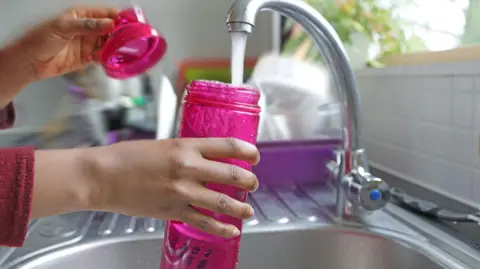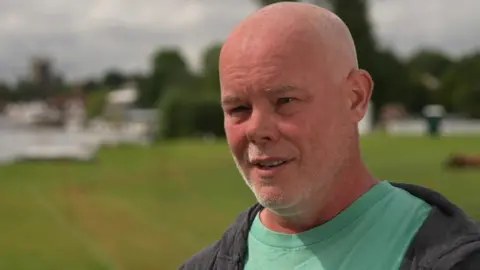 .
.Water bills in England and Wales are set to rise by an average £19 per year until 2030, industry regulator Ofwat has said.
Although this will put more pressure on households, it is a third less than the amount requested by water companies.
The bill hike is intended to fund investment for improvements such as replacing leaking pipes and reducing sewage discharges into rivers and seas.
It comes as suppliers face increasing scrutiny over their environmental and financial performance over the past years, as well as anger over executive pay.
The bill hike varies by region, with Thames Water customers facing an increase of £99 or 23% over the nest five years, Anglian customers looking at £66 or 13%, and Southern Water customers facing £183, an increase of 44%.
The proposed bill rises can be challenged by the water firms, with a final determination due at the end of the year with increases set to take place from April.
Industry group Water UK said the proposed plans were “the biggest ever cut in investment.”
“As a direct result, more housing will be blocked, the recovery of our rivers will be slower and we will fail to deal with the water shortages we know are coming,” a spokesperson said.
Labour has pledged a crackdown on the industry, promising consumers higher compensation for sewage failures and the power to hold executives to account.
The new Secretary of State for Environment Food and Rural Affairs, Steve Reed, is meeting water company bosses on Thursday to discuss performance issues and ways of improving it.
Total average proposed bills in 2029-30:
Water and wastewater companies:
- Anglian Water: £557 – up 13% from current prices
- Dŵr Cymru: £603 – up 29%
- Hafren Dyfrdwy: £524 – up 32%
- Northumbrian Water: £460 – up 11%
- Severn Trent Water: £496 – up 23%
- Southern Water: £603 – up 44%
- South West Water: £561 – up 13%
- Thames Water: £535 – up 23%
- United Utilities: £536 – up 21%
- Wessex Water: £497 – down 2%
- Yorkshire Water: £537 – up 25%
Water only companies:
- Affinity Water: £203 – up 6%
- Portsmouth Water: £135 – up 18%
- South East Water: £248 – up 8%
- South Staffs Water: £183 – up 14%
- SES Water: £187 – down 15%
Ofwat chief executive David Black said its plan marked the “biggest ever” investment in the water sector and would mean “sustained improvement to customer service and the environment at a fair price for customers.”
He told Radio 4’s Today Programme it was “very concerned” about the level of bonuses that the companies are paying.
“That’s why we have introduced new measures to protect customers. In the last year, no customer paid for executive bonuses.”
The Consumer Council for Water, a government-funded body, estimated that “about two million households in England and Wales currently cannot afford their water bill”.
It said an increase in assistance for struggling households was “welcome” but “falls short of what is needed”.
“Customers understand investment is urgently needed but they need reassurance that every pound of their money is going to be well spent,” said chief executive Mike Keil, adding that “trust in water companies has never been lower”.
The UK’s biggest water firm, Thames Water, is being put under fresh scrutiny by Ofwat, with a new “oversight regime” to make sure the company improves its performance.
Ofwat said Thames Water must provide a “delivery action plan” and regularly report on progress, assessed by a third party.
The regulator said it was considering appointing an independent monitor to report on the company’s progress.
Thames Water is at risk of a downgrade in the credit rating of its debts from S&P Global, the ratings agency said on Thursday.
The government plans to introduce new measures to ensure that money earmarked for investment and improvements are ringfenced and cannot be diverted to pay salaries or dividends.
Customer panels will have powers to hold directors and executives to account while compensation for customers for failures to hit required standards could be more than doubled.
The crackdown comes at a time of rising consumer anger at pollution but also at a time when some companies – including heavily indebted Thames Water – have asked for leniency due to financial distress.
‘High levels of pollution’

Dave Wallace is a citizen scientist who has been testing the water in the River Thames where he lives in Henley.
“We started last year with our testing after some kids got ill,” he said.
“Also I’d been swimming and found myself swimming in what I’d describe as solids and started wondering what on earth is going on.
“We’ve actually found high levels of pollution and found very high levels of ecoli on the river.
“I’ve stopped swimming because we know people are getting sick from going in the river.”
He said there had been reports of an increase in sickness and diarrhoea as well as people getting infected sores and contracting sepsis.
“It’s not just people but dogs as well there’s lots of reports of dogs getting ill from going in the water,” he said.
